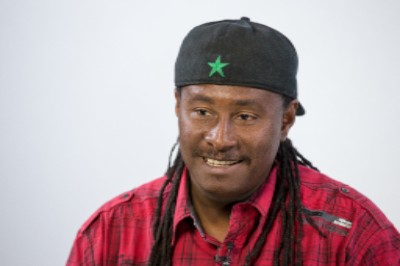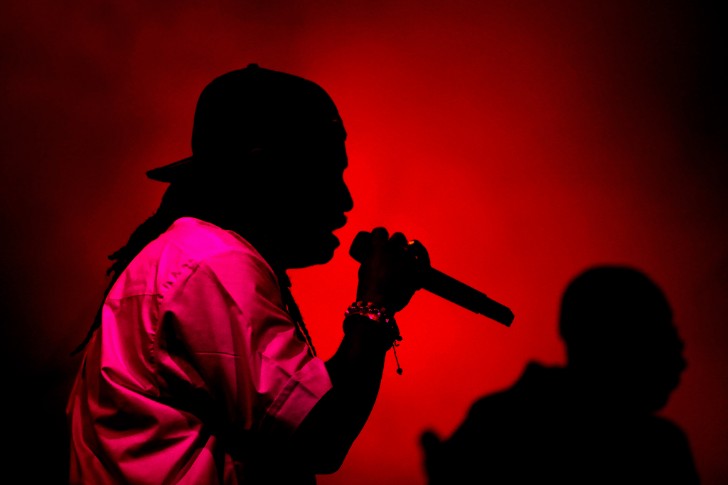
Didier Awadi on the Future of Music in Africa
By Catherine Jewell, Communications Division, WIPO
A high point of this year’s World Intellectual Property Day celebrations at WIPO’s headquarters in Geneva, Switzerland, was a panel discussion entitled Get Up, Stand Up: What’s Ahead for Music? The event brought together speakers from across the industry to explore the impact of the digital revolution, which is fundamentally changing the way creative works are produced, distributed and consumed. The following is a compilation of comments by the pioneering West African rap artist and music entrepreneur Didier Awadi, who took part in the event and shared his thoughts about what music means to him and the future of music in Africa.

On music
Music provides peace of mind and is the expression of your soul, so for me music is a fundamental right. We artists have our rights – copyright and related rights – and these rights need to be respected by everyone, by consumers as well as the music industry at large.
On opportunities and challenges in digital environment
We have this wonderful opportunity provided by the Internet, but also by telephony. The level of telephone penetration in Africa is really astounding. Everyone has one, two or three mobile phones. All these phones, which are quite affordable, can be used to play music or download music or video, and telephone companies are doing everything to provide Internet free of charge and to make 4G telephones widely available. Mobile phones are the way of the future.
The challenges we face will depend on how we use mobile phones, the framework we have to regulate their use and whether our governments are willing to follow through with this great leap forward. We recording artists must do everything we can – we have to sit down, talk together and speak with one voice so all the different commercial players understand that we have rights and that we must be remunerated in an equitable fashion.
The digital context opens many panoramas. It is easy to create material, often with modest means, and to get it out onto music platforms which make it quick and easy for people to listen to our music, and which are global. That’s wonderful. But of course, once the music is out there, it can be easily downloaded so that means a loss of income. Also, once you give your music up to a platform you don’t really have any control over what they do with it. If your work is being broadcast over different platforms you can never be sure that you are being fairly compensated. There needs to be greater transparency about where the money is going to make sure creators get their fair share. This is especially important in the South, where the legal framework is all too often lacking. It is true we do have opportunities, but the only thing we really control today is live performance. That is where you can be really creative and do something original that can be heard around the world.
On the impact that new music business models will have on developing countries
In many African countries, artists are up to speed on new subscription services for streaming but they don’t really trust the system because it doesn’t remunerate well. It really takes a lot of turnover to get a little money in your pocket. If African recording artists are not fairly remunerated they will not be interested in these new business models because we live in a constant state of emergency. If artists like Jay Z are creating their own streaming platform, it is because there is a problem in the way streaming is being implemented. If artists themselves want their own platform which remunerates them fairly, it is because the system is not transparent enough. As I see it, streaming is good for consumers to access their playlists, but are artists getting properly remunerated for their creativity? It’s true, streaming is interesting, but economically speaking it does not bring in much money. We are waiting to see what will happen. Telephone companies are signing mega deals with big record companies to have access to their catalogues but for the time being we do not really see what is in it for us.

On improving artists’ rights in Africa
In Senegal things are starting to change for the better but it is an uphill battle. It is like crossing an ocean in a row boat, but things are moving forward. Generally speaking, every country has a collective management society that looks after authors’ rights and these are all affiliated, so our rights are, in effect, protected by different societies the world over. Recording artists from many different African countries are working to defend their rights on streaming platforms through the Arterial Network in South Africa (www.arterialnetwork.org/about/vision). We have to reach out to one another and share our knowledge, but governments also need to put proper legal structures in place. In Senegal we have fought hard to have our say in writing the recently enacted legislation on collective management of copyright and related rights, but bringing about this kind of change requires in-depth knowledge of copyright law. We need greater harmonization of copyright laws across Africa. For example, if a sub-regional organization like the Economic Community of West African States (ECOWAS) could harmonize its laws that could fan out across Africa. This needs to be done quickly. We already have a framework in place for terrestrial broadcasting, but we need a harmonized framework for online content.
On the future
In Africa, the revolution will not be television, it will be telephones. There is a cable running down the backbone of Africa from North to South and it is bringing in lots of data and content. The challenge for African recording artists is to create and produce content for our market, and to make it available to the world. We need to be looking outward towards the recording companies, the publishers, and streaming platforms and services to see to it that we can strike a fair deal in all countries. All too often we are reluctant to let go of our works and to release them to streaming platforms because transparency is lacking. I appeal to all countries to put into place the legal frameworks that we need so that we can earn a decent living from our creations like artists elsewhere in the world.
The WIPO Magazine is intended to help broaden public understanding of intellectual property and of WIPO’s work, and is not an official document of WIPO. The designations employed and the presentation of material throughout this publication do not imply the expression of any opinion whatsoever on the part of WIPO concerning the legal status of any country, territory or area or of its authorities, or concerning the delimitation of its frontiers or boundaries. This publication is not intended to reflect the views of the Member States or the WIPO Secretariat. The mention of specific companies or products of manufacturers does not imply that they are endorsed or recommended by WIPO in preference to others of a similar nature that are not mentioned.